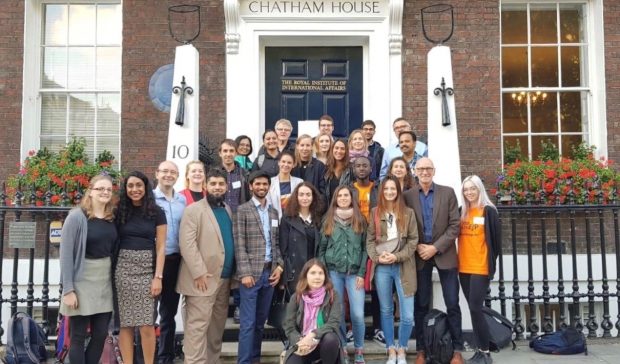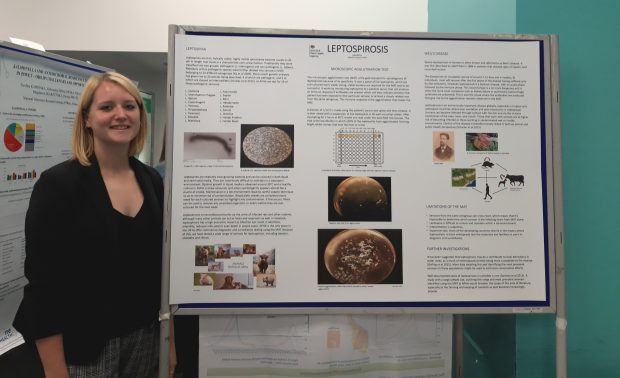In this blog, we hear from Hannah Fry, from APHA’s Surveillance and Laboratory Services Department, as she shares her experiences of the first One Health EJP Summer School, hosted by the University of Surrey.

Why Summer School?
I have always been interested in animal health and environmental science, so when the chance came to attend the One Health Summer School, organised by institutes in the One Health European Joint Programme (OHEJP), I leapt at the opportunity!
I heard about the Summer School because APHA is a member of the OHEJP, a European network of scientific organisations across 19 member states working on animal, human or environmental health. The aim of the OHEJP programme is to reinforce collaboration between the institutes by enhancing cooperation and integration of scientific activities on topics such as Foodborne Zoonoses (FBZ), Antimicrobial Resistance (AMR) and Emerging Threats (ET). They do this through joint projects, education and training.
The Summer School, at Chatham House in London, was one of the education events organised jointly by the University of Surrey, Wageningen Bioveterinary Research and Public Health England (all members of the OHEJP). The two week course is aimed at giving students and researchers a thorough understanding of the complexity of One Health challenges and how to address them, evaluation tools to implement interventions and importantly an ability to recognise the effective approaches to preparedness and response to threats.
Expertise from across the globe
Over the course of the two weeks, experts flew in from all over the world to talk to us about the One Health concept. This is a term to describe the linkage between animal, human and environmental health and how they should be considered together when tackling global health problems, for example infectious disease outbreaks.
The event was well attended with delegates coming from as far as America and Thailand - all with different experiences of working in animal and human health industries or research.
Talks and workshops were run by numerous high-profile organisations, such as the World Health Organisation (WHO), Wageningen University in the Netherlands, Department for Environment, Food and Rural Affairs (Defra), Animal and Plant Health Agency (APHA), Public Health England (PHE), University of Kansas and Chatham House in London.
We discussed many different aspects of One Health including policy making, statistics, stakeholders, communication, as well as study design and ethics.
We spent time learning how statistics and advanced mapping techniques can be used to analyse disease outbreak spread and even predict additional epidemics elsewhere in space or time. We learnt about the policy makers and risk assessors who use this data to decide the likelihood of an outbreak in their respective countries and how the population could be affected. As someone who has always found maths quite challenging, this was certainly mind-blowing!
Talks and workshops given by PHE, Defra and APHA showed just how much work goes on in the background in policy making when there is a disease outbreak, even when its thousands of miles away, in order to safeguard public health in our own country, for example Ebola. This is becoming especially important as global travel and transportation of goods increases.
We were given an insight into how the One Health approach can be used in the competitive market with speakers from the veterinary pharmaceutical company, Zoetis, showing us how to identify and communicate with different stakeholders when selling veterinary medicinal products.
More than something for my CV
Before the start of summer school, we were tasked with making posters outlining our areas of study or work to present to the other attendees. My poster was on Leptospirosis, a bacterial disease affecting humans and animals. I found it really useful doing my own research into the current literature and history of the disease and I have definitely improved my knowledge and understanding of the disease, which I can now apply to my work. Doing the presentation really pushed me out of my comfort zone too as I am not used to speaking in front of audiences, but it is something that I have always wanted to improve on as it’s such a useful skill.

As well as increasing my coffee consumption astronomically, the One Health Summer School provided an amazing opportunity to meet some of the experts in science and policy making from all over the world. More than just something to put on a CV, I think the experience has genuinely helped change the way I perceive and approach problems which will help me to improve and progress in my role at APHA. It was a great programme and I would highly recommend the One Health Summer School to anyone who is interested in animal or human health and science in policy making.
Why not read more?
We have previously published One Health blogs which you may be interested in reading. Click the links below to find out more about the work of APHA in this area.
Promoting APHA science in style
In this blog, Prof. Ian Brown, Head of the Virology Department tells us about an event APHA scientists attended at the British Embassy in Paris to promote our international scientific capabilities to colleagues from around the world.
APHA Weybridge hosts One Health conference
On 26 November 2018, APHA Weybridge hosted the first Inventory and Ambitions workshop for the One Health European Joint Program funded COHESIVE Project in a two day conference. In this blog, Charlotte Cook, Senior Risk Analyst, talks about the event and the importance of professional networks across Europe.
Enjoyed reading? Then why not subscribe to the APHA Science Blog

Recent Comments